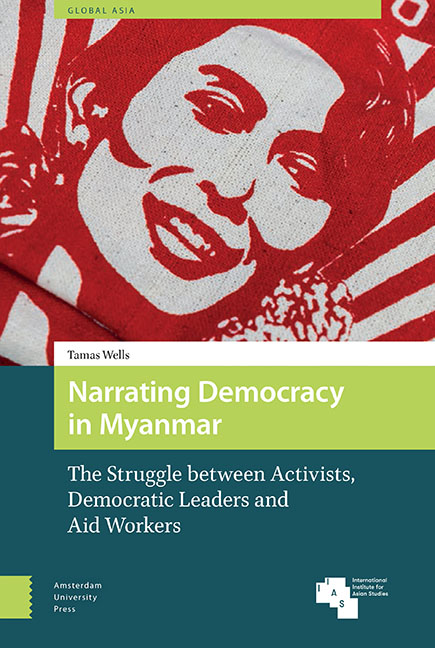Book contents
- Frontmatter
- Contents
- Abbreviations
- Acknowledgements
- Foreword
- 1 Introduction
- 2 Elucidating the Meaning of Democracy through Narrative
- 3 Toward the ‘Ocean of Democracy’?: The British Colonial Administration, the Thakin and Contests over Meanings of Democracy in late Colonial Burma
- 4 Burma after Independence: From Moral to ‘Disciplined’ Democracy
- 5 A liberal Narrative
- 6 A benevolence Narrative
- 7 An Equality Narrative
- 8 Exposing the Political use of Narratives
- 9 Beyond an ‘Ideal type’
- 10 Playing Different Games: Myanmar’s Future Challenges
- Index
2 - Elucidating the Meaning of Democracy through Narrative
Published online by Cambridge University Press: 17 June 2021
- Frontmatter
- Contents
- Abbreviations
- Acknowledgements
- Foreword
- 1 Introduction
- 2 Elucidating the Meaning of Democracy through Narrative
- 3 Toward the ‘Ocean of Democracy’?: The British Colonial Administration, the Thakin and Contests over Meanings of Democracy in late Colonial Burma
- 4 Burma after Independence: From Moral to ‘Disciplined’ Democracy
- 5 A liberal Narrative
- 6 A benevolence Narrative
- 7 An Equality Narrative
- 8 Exposing the Political use of Narratives
- 9 Beyond an ‘Ideal type’
- 10 Playing Different Games: Myanmar’s Future Challenges
- Index
Summary
Abstract
As opposed to the assumption of an ‘ideal type’ of democracy – which is present in much mainstream democratisation scholarship – the second chapter in this book begins by drawing on W.B. Gallie's notion of the ‘essential contestability’ of democracy. Meanings given to the word ‘democracy’ are inevitably open-ended and dependent on context. Recent interpretive studies have established the context-specif ic nature of meanings of democracy and sought to ‘elucidate’ meanings of democracy on their own terms. Chapter Two extends this work to show how attention to narratives can ground and locate meanings of democracy and expose the ways in which they can be wielded as political tools.
Keywords: democracy, interpretivism, narrative analysis, essential Contestability
Democracy is the inspiration for many social movements in today's world. But what does democracy mean to activists or political party leaders? If democracy does not have a taken-for-granted meaning, then understanding how meanings may vary – and how these differences might help to make sense of policy decision-making and political contests – is important. Before turning to the Myanmar context in the following chapters, my argument in this chapter is that an interpretivist approach, and in particular narrative analysis, can open new possibilities in elucidating the concept of democracy across varied linguistic, cultural and political contexts (Schaffer 2016).
From the work of Roe (1989) on complex public policy disputes, to Labov and Waletsky's (1997) seminal work in linguistics, and Moon's (2006) work on narratives of reconciliation, scholars have applied narrative theory in a range of academic disciplines. Some disciplines have even taken a so-called ‘narrative turn’ (Ospina & Dodge 2005). The distinguishing feature of this shift is the desire by researchers to use the framework of story to understand diverse, rather than universal, meanings of concepts or events, meanings that are temporally and spatially defined (Bacon 2012). Attention to plot and characters in the way concepts are communicated by political actors can generate new insights, both into how concepts are understood by these actors and how concepts are used politically to forward certain agendas while undermining others. It is surprising, then, that there is an absence of systematic application of narrative theory to the analysis of meanings of democracy within democracy and democratisation scholarship.
- Type
- Chapter
- Information
- Narrating Democracy in MyanmarThe Struggle Between Activists, Democratic Leaders and Aid Workers, pp. 31 - 54Publisher: Amsterdam University PressPrint publication year: 2021



